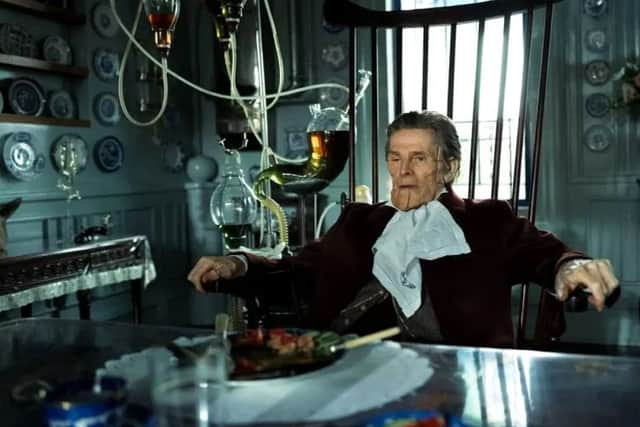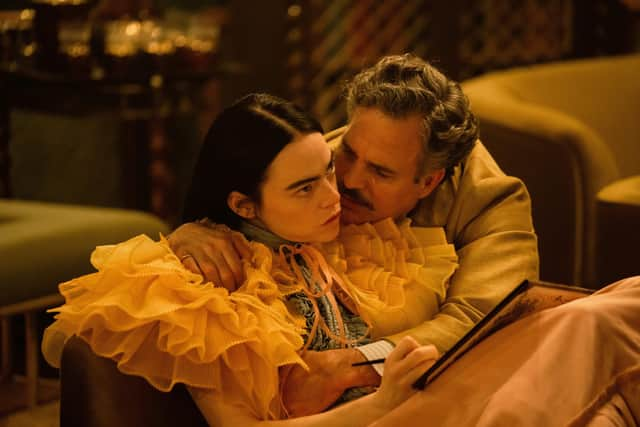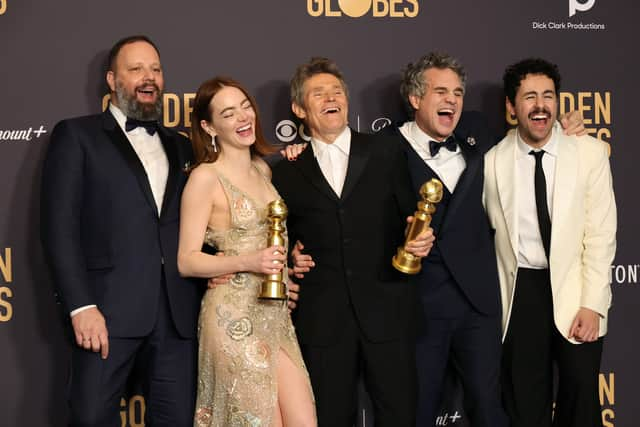Alasdair Gray Archive share thoughts on Poor Things as A-list actor reveals Glasgow inspirations
and live on Freeview channel 276
Poor Things was released last Friday (January 12) and the film, adapted from the works of Glaswegian artist and novelist Alasdair Gray, has went down a storm with audiences and critics across the world - despite some controversy that Glasgow would no longer feature as the setting.
Starring A-list Hollywood actors like Emma Stone, Willem Defoe, Mark Ruffalo, and Ramy Yousef - the film was directed by the Greek director Yorgos Lanthimos and had a budget of $35 million. Based on the novel of the same name by Alasdair Gray published in 1992, whose works also include his seminal first novel Lanark and his painting 'Cowcaddens Streetscape in the Fifties' which was recently put on exhibition at the Kelvingrove Art Gallery and Museum.
Advertisement
Hide AdAdvertisement
Hide AdWillem Defoe revealed that he listened back to tapes of Alasdair Gray to influence his Scottish accent for his role as Baxter - a character which in and of itself has influences from the multi-talented Riddrie artist - one only needs to look at the mish-mash facial structure of the character to realise how closely it resembles how faces are represented in Gray's artwork.
Willem Defoe said: "I listened to tapes of Alasdair Gray, and even though I wasn't trying to copy that accent I liked how he spoke and he had a wicked sense of humour and I think he put a lot of himself into the character of Baxter."


So far the film has won two Golden Globes - as well as netting the top prize when it debuted at the Venice Film Festival in September. Just last week the film won two Golden Globes and is expected to see more success in the 2024 BAFTA Awards as well as the Oscars.
Despite the controversy over the removal of Glasgow as the setting for the film adaptation, Alasdair Gray's son, Andrew Gray, believes the cast and crew treated the adaptation with respect and admires the film, having seen it seven times now according to the BBC - including a special screening at the Glasgow Film Theatre.
Advertisement
Hide AdAdvertisement
Hide AdAndrew also stated that his father signed a contract with director Yorgos back in 2012 - and set no stipulations for the film. The heir of the Gray estate believes that the film can only be a good thing for the legacy of his father, and is likely to bring new readers and acclaim to the writings and work of Alasdair Gray.
The foremost experts on all things Gray are the people at The Alasdair Gray Archive, a charity based right here in Glasgow centred around preserving and championing the works of one of the greatest Glaswegian novelists. They expressed worry in the lead-up to the release of the film, centred around the shift in setting from Glasgow to futuristic steampunk-influenced versions of Paris, Lisbon and London.


However they released a definitive statement on Saturday January 13 expressing their support and respect for the film, writing on social media they said: "Lanthimos is a brave and unique maker, and the team he has assembled from set, costume, hair & make up, cinematography and score are outstanding. In its aesthetic sensibility their are echoes of Alasdair Gray’s seminal text.
"Places are named but are visualised in other worldly ways which makes the question raised around Glasgow’s omission seem a moot point. The novel and the film are distinct and separate. Lanthimos has interpreted Gray’s text, creatively reconfiguring it in a tradition which Gray upheld throughout this own creative life.
Advertisement
Hide AdAdvertisement
Hide Ad"The book presents the story of Victoria/Bella from a range of perspectives, layered within it are Gray’s distinct artworks, hand drawn letters, maps and ‘historical’ material. Like with other Gray texts he presents this in a way that forces the reader to critically evaluate and draw their own conclusions of the ‘truth’.
"This allows the text to draw on multiple themes including feminism, colonialism and gender fluidity. Tony McNamara’s script takes McCandles version of Bella as truth, focusing on her journey to self determination. This feminist reading humorously critiques the patriarchy via Mark Ruffalo’s exceptional acting as the rakish Wedderburn.
"To see Bella and Duncan’s narrative arcs connect then follow diametrically opposing journeys heightens this, with Bella’s determination to experience life in all its forms the key to her freedom (books help too, knowledge is power!).
"Only slights was the extra Bella (felt unnecessary and reinforced Bella being special) and Blessington’s ending. Can’t wait to watch it again, and again and again…."
Advertisement
Hide AdAdvertisement
Hide Ad

In anticipation of the film, the Alasdair Gray Archive released a digital guide to the Poor Things novel - which you can read here.
As well as their guide, the archive catalogue and disseminate all things Gray, so if you're a fan of the new film - take it as a jumping off point to discover the other works by Alasdair Gray, and the best place to get started on that journey is through their free public resource at the Alasdair Gray Archive website.
Comment Guidelines
National World encourages reader discussion on our stories. User feedback, insights and back-and-forth exchanges add a rich layer of context to reporting. Please review our Community Guidelines before commenting.
